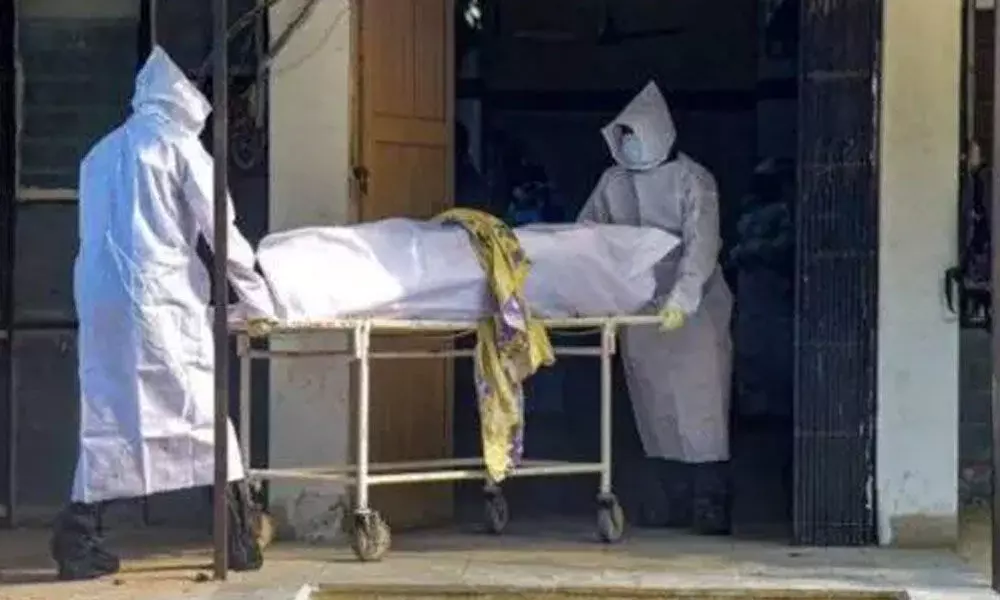Live
- Three persons admitted to hospital for diarrhea treatment
- First Star Outside Milky Way Captured: WOH G64 is 2,000 Times Larger Than the Sun
- Sikkim govt to constitute state Niti Ayog: CM Tamang
- CBI books Rajasthan narcotics inspector for Rs 3 lakh bribe
- Rajasthan bypolls: A tough contest between BJP and Congress
- Albania joins SEPA, paving way for EU integration
- Japanese government approves 250-billion USD economic package to ease price pain
- Six pharma companies to set up their units in Telangana
- The Unstable Events of a 17-Wicket Day in Perth: India vs Australia
- Dutch FM's Israel trip cancelled after Netanyahu's arrest warrant
Just In
Coronavirus doesn't remain active after death: AIIMS


Coronavirus doesn’t remain active after death: AIIMS
Coronavirus doesn't remain active in nasal and oral cavities 12 to 24 hours after the death of an infected person as a result of which the risk of transmission from the deceased is highly unlikely, AIIMS Forensic Chief Dr Sudhir Gupta said
New Delhi: Coronavirus doesn't remain active in nasal and oral cavities 12 to 24 hours after the death of an infected person as a result of which the risk of transmission from the deceased is highly unlikely, AIIMS Forensic Chief Dr Sudhir Gupta said. A pilot study was conducted over the last one year in the Department of Forensic Medicine at AIIMS on COVID-19 positive medico-legal cases which were subjected to post-mortem. "Around 100 bodies were re-tested for coronavirus infection in an interval of 12 to 24 hours after death and the result was negative. The virus does not remain active at all in nasal and oral cavities 24 hours after death," Dr Gupta told PTI.
"The risk of transmission of coronavirus 12 to 24 hours after the death of an infected person is highly unlikely," he said. For safety purposes, he said, nasal and oral cavities should be plugged to prevent leakage of body fluids or other orifices or punctures resulting from removal of catheter, drains, tubes should be disinfected. Also as a precautionary measure, people handling such bodies should wear protective gear such as masks, gloves and PPE kits. "Collection of bones and ashes is completely safe as there is no risk of transmission of infection from the mortal remains," Gupta said.
"The study was conducted in the interest of preserving the dignity of the dead," he stated. The ICMR in its 'standard guidelines for medico-legal autopsy in COVID-19 deaths' issued in May, 2020 advised that invasive techniques should not be adopted for forensic autopsy in COVID-19 deaths as mortuary staff are exposed to potentially dangerous health risks due to organ fluids and secretions even after taking the highest precautions.
The waiving of a post-mortem will prevent the spread of infection to doctors, mortuary staff, police persons and all the people involved in the chain of dead body disposal. Non-invasive autopsy techniques, as described in guidelines, should be used, if at all required, to prevent the risk of spreading the infection to mortuary staff, police personnel and contamination of mortuary surfaces, the guidelines stated. "If the autopsy surgeon feels that he will not be able to conclude cause of death or any other related issue without dissection, then he can proceed with minimal invasive/limited internal dissection. "However, the dissection has to be performed keeping in mind that the conduction of autopsy is a high-risk procedure which is potentially as hazardous as any other procedure performed on the body of a COVID-19 patient," the guidelines said, listing the precautions to be followed while conducting an autopsy by adopting proper infection control measures.

© 2024 Hyderabad Media House Limited/The Hans India. All rights reserved. Powered by hocalwire.com






